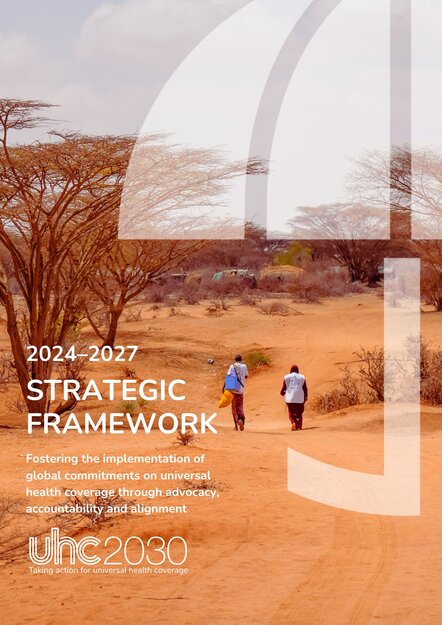UHC2030 hosted its annual UHC Day parliamentarian town hall to...
1 May 2024
UHC2030’s new 2024-2027 Strategic Framework outlines three pathways for collective action to achieve meaningful progress towards universal health coverage before the next UN high-level meeting in 2027 and to help countries achieve SDG target 3.8 by 2030

Upon taking our new roles as co-chairs of the UHC2030’s Steering Committee, we are both humbled and honored. Humbled in the face of a blighted reality: 4.5 billion people — more than half of the world’s population — are not covered by essential health services, and financial protection is deteriorating, with 2 billion people experiencing financial hardship due to out-of-pocket health costs. Not only are people still left behind in the absence of adequate quality health services, but they are often further pushed behind by additional barriers hindering them from accessing the health services they need. This is utterly unacceptable.
We are also honored, by the opportunity and by the warm welcome we received during the UHC2030 Steering Committee meeting last week, which bolstered our fierce determination and firm belief that change is possible and achievable. By placing universality, equity and the right to health at the center of our work, we can accelerate sustainable progress towards UHC. By focusing on building equitable and resilient health systems, anchored in a primary health care approach, we can also provide the foundation to achieve health security. And by investing in gender-responsive, rights-based, climate-resilient and adaptive health systems, we can tackle health inequities, barriers to human rights and gender inequality.
To implement UHC, we must first prioritize the health needs and access of people in vulnerable and marginalized situations. This means removing financial barriers and preventing financial hardship by providing access to a core package of health services that are of quality and affordable or free of charge. This also means ensuring a robust health and care workforce to deliver these core services. We must further rebuild trust by fostering inclusive health governance through social participation and ensure that health policies and services are responsive, equitable and effective.
As the leading global multi-stakeholder platform uniting diverse voices and perspectives behind UHC, UHC2030 is uniquely placed to sustain and galvanize political momentum on UHC commitments and to promote collective action to strengthen health systems.
During the Steering Committee meetings held last week (25–26 April 2024), our constituencies endorsed the UHC2030 Strategic Framework for 2024–2027. This document outlines our collective actions and targets for the next three years. They are structured around three pathways for change:
- Advocacy: Influencing decisions by political, economic and social institutions to advance UHC
- Accountability: Tracking the implementation of commitments to foster actions, decisions, policies and programmes for UHC
- Alignment: Convening stakeholders to exchange information and to elevate the importance of alignment with one national plan and of working within national structures to strengthen health systems
Developed in close consultation with the UHC2030 Steering Committee’s constituencies, this Framework highlights how UHC2030 will harness the power of its constituencies and entities on the path towards the next UN High-level meeting on UHC in 2027 and in the last stretch before the 2030 milestone for the Sustainable Development Goals (SDGs). It provides an overview of key activities UHC2030 will implement collectively over the next three years to ensure that UHC commitments are translated into laws, policies, programmes and budgets.
As new co-chairs, we are thrilled to embark on this journey. We count on all our members and partners to join us in this new chapter. Together, we can achieve the change we want to see.
UHC2030 co-chairs Dr Magda Robalo and Dr Pamela Cipriano
More UHC2030 News
A global health financing emergency threatens progress toward...
UHC2030 at HSR2024: Advancing equity and inclusion in health systems through civil society knowledge
UHC2030, in collaboration with the SUPPORT-SYSTEMS research...
